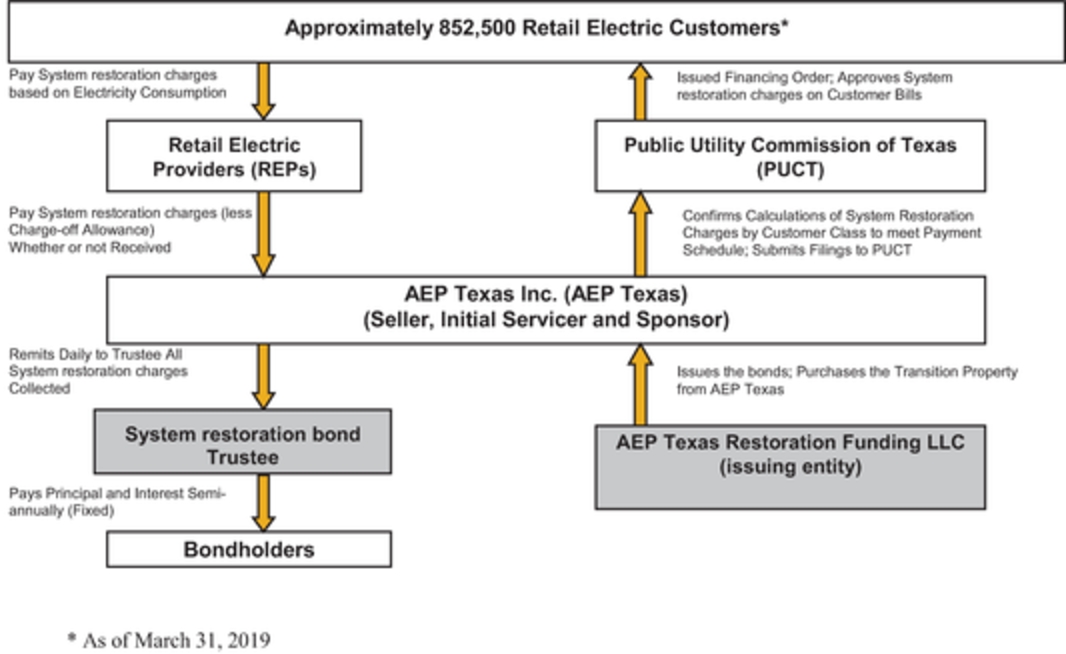GLOSSARY OF DEFINED TERMS
Set forth below is a list of the defined terms used in this prospectus:
AEP means American Electric Power Company, Inc.
AEP Texas means AEP Texas Inc.
Bankruptcy Code means Title 11 of the United States Code, as amended.
Basic Documents means the Administration Agreement, the Sale Agreement, Servicing Agreement, Indenture, Intercreditor Agreement and any supplements thereto or the bill of sale given by the seller and the notes evidencing the system restoration bonds.
Business day means any day other than a Saturday, a Sunday or a day on which banking institutions in Dallas, Texas, New York, New York, or Columbus, Ohio are, or DTC or the corporate trust office of the trustee at which the indenture will be administered is, authorized or obligated by law, regulation or executive order to remain closed.
Clearstream means Clearstream Banking, Luxembourg, S.A.
Collateral means all of our assets pledged to the trustee for the benefit of the holders of the system restoration bonds, which includes the transition property, all rights of the issuing entity under the sale agreement, the servicing agreement and the other documents entered into in connection with the system restoration bonds, all rights to the collection account and the subaccounts of the collection account, and all other property of the issuing entity relating to the system restoration bonds, including all proceeds.
Collection account means the segregated trust account relating to the system restoration bonds designated the collection account and held by the trustee under the indenture.
DTC means the Depository Trust Company, New York, New York, and its nominee holder, Cede & Co.
Eligible institution means (a) (the corporate trust department of the trustee, so long as any of the securities of the trustee have either a short-term credit rating from Moody’s of at least “P-1” or a long-term unsecured debt rating from Moody’s of at least “A2” and have a credit rating from S&P in one of its generic rating categories which signifies investment grade; or (b) a depository institution organized under the laws of the United States of America or any state (or any domestic branch of a foreign bank), which (i) has either (A) a long-term issuer rating of “AA-” or higher by S&P and “A2” or higher by Moody’s, or (B) a short-term issuer rating of “A-1+” or higher by S&P and “P-1” or higher by Moody’s, or any other long-term, short-term or certificate of deposit rating acceptable to the rating agencies and (ii) whose deposits are insured by the FDIC.
ERISA means the Employee Retirement Income Security Act of 1974, as amended.
ERCOT means the Electric Reliability Council of Texas, Inc.
Euroclear means the Euroclear System.
Excess funds subaccount means that subaccount of the collection account into which funds collected by the servicer in excess of amounts necessary to make the payments specified on a given payment date.
Excess payments means advances paid to the servicer by the retail electric provider in excess of amounts paid by retail electric customers to the retail electric provider on an annual basis.
Exchange Act means the Securities Exchange Act of 1934, as amended.
Financing order means, unless the context indicates otherwise, the financing order issued by the Texas commission to AEP Texas on June 17, 2019 in Docket No. 49308.
Indenture means the indenture to be entered into between the issuing entity and the trustee, providing for the issuance of system restoration bonds, as the same may be amended and supplemented from time to time.
Internal Revenue Code means the Internal Revenue Code of 1986, as amended.
Issuing entity means AEP Texas Restoration Funding LLC.

